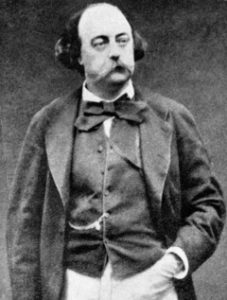by James Scott Bell
@jamesscottbell
Gustave Flaubert (1821 – 1880) was, of course, the French novelist known primarily for his masterpiece, Madame Bovary. He was a man of tremendous passion and ambition. His greatest desire, from a young age, was to become a world-class novelist.
At the age of 24, Flaubert was mesmerized by a painting depicting the temptation of St. Anthony. It inspired his first attempt at a novel. Flaubert worked on it off and on for the next five years, finally completing a 500 page manuscript in 1849.
Now what?
Flaubert had two close literary friends, Maxime Du Camp and Louis Bouilhet. He called them to his home in Croisset on the condition that they listen to him read the entire manuscript out loud, not uttering a single word until he was done!
Yeesh.
Just before the reading began, Flaubert declared, “If you don’t cry out with enthusiasm, nothing is capable of moving you!”
Then he began to read. Two four-hour sessions per day!
Flaubert ended a little before midnight on the fourth day. The exhausted would-be novelist put down the last page and said, “It is your turn now. Tell me frankly what you think.”
Du Camp and Bouilhet were in agreement that the latter should speak for them both.
Bouilhet cleared his throat and said, “We think you should throw it in the fire and never speak of it again.”
Now that is what you call a short and sweet critique.
The reaction, as described by Prof. James A. W. Heffernan in a lecture on Flaubert, was as follows:
Flaubert was flabbergasted. And of course he did talk about it—the three of them argued about it heatedly all through the night, right up until eight o’clock the next morning—with Flaubert’s mother listening anxiously at the door. Flaubert defended it as best he could, pointing out fine passages here and there, but fine passages alone don’t make a good book. His friends saw no progression in the story, no vitality in the figure of St. Anthony himself, no real grip on the theme. Essentially, they argued, Flaubert had taken a vague subject and made it vaguer. He had fatally indulged his own Romantic tendency toward lyricism—toward the fantastic, toward the mystical. To get a grip on these tendencies, Flaubert needed something that could not be treated lyrically.
Flaubert’s two friends did not let him wallow in despair. Instead, they gave him some advice that would change his writing forever. Don’t try to tackle some big theme in a lyrical manner, they told him. Write about something down-to-earth, and do it in a naturalistic style. Prof. Heffernan recounts:
On the day after the long night of the argument, the three friends took a walk through the gardens of Croisset by the River Seine. According to Maxime du Camp, Bouilhet suddenly proposed that Flaubert write a novel based on the true story of a public health officer whose second wife committed adultery, got herself into debt, and then poisoned herself.
Flaubert took their advice. In 1851 he began writing his second novel, Madame Bovary.
The lessons here:
- Good beta readers are those who will be completely honest with you, but also are capable of giving you specifics on what doesn’t work.
- Don’t overestimate your prowess by telling your beta readers, “If you don’t cry out with enthusiasm, nothing is capable of moving you!”
- Perhaps it’s best to give your beta readers a manuscript, rather than reading it to them out loud. But that’s entirely up to you.
Do you have trusted beta readers? How have they helped you?

